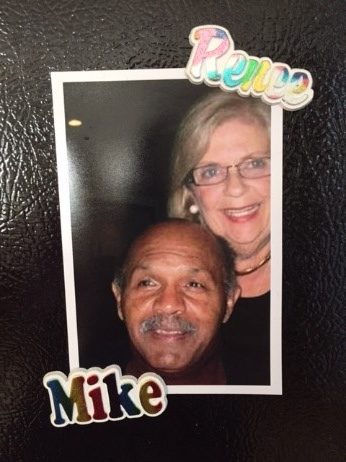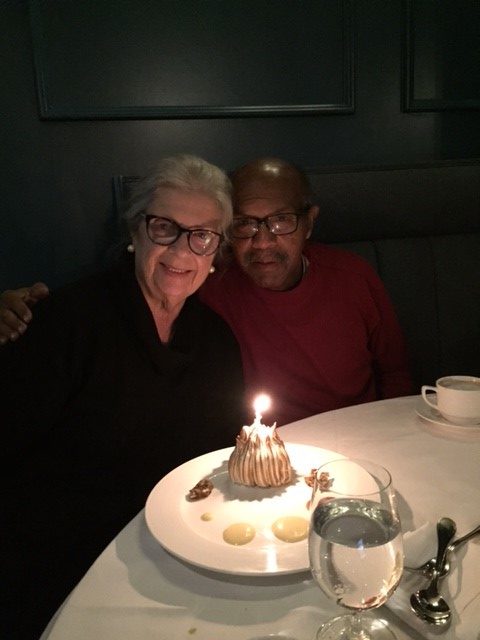 When Mike and I met and married over 37 years ago, we were almost like the Brady Bunch times two. My five kids and his six daughters made for loud, but happy, family meals when we were all together. Like any family, we juggled the needs of our kids while working, me as a nurse, and Mike as a Suffolk County (Long Island) police detective. Mike loved his career with the police department and often worked undercover for the vice unit until he retired about ten years ago. But even after he retired, Mike remained active. He and a group of guys he’s known for more than 40 years played basketball and softball nearly every weekend.
When Mike and I met and married over 37 years ago, we were almost like the Brady Bunch times two. My five kids and his six daughters made for loud, but happy, family meals when we were all together. Like any family, we juggled the needs of our kids while working, me as a nurse, and Mike as a Suffolk County (Long Island) police detective. Mike loved his career with the police department and often worked undercover for the vice unit until he retired about ten years ago. But even after he retired, Mike remained active. He and a group of guys he’s known for more than 40 years played basketball and softball nearly every weekend.
Several years ago, I noticed Mike experiencing some concerning symptoms. For example, he didn’t seem to have a sense of smell, nor did he swing his arms while walking. As an RN, this combination of non-motor and motor symptoms led me to suspect that he had Parkinson’s disease, which the doctor confirmed in 2011. Despite the diagnosis, we still continued to enjoy a lot of our everyday activities. Mike still played sports and didn’t have to stop until just this past summer when his rigidity increased. But even those limitations weren’t as upsetting as when in 2015, Mike’s Parkinson’s disease progressed in an unexpected way.
Surprising Symptoms
While on vacation with friends in Puerto Vallarta, Mexico, Mike and part of our vacation group went charter boat fishing. When they returned, Mike related to me that during the trip he saw a huge ice flow coming at them. Of course, I didn’t believe him and thought he must be joking as ice flows aren’t common in Mexico. But when Mike kept insisting that he saw ice, we both got really annoyed and frustrated with each other as neither of us would concede the point.
Less dramatic, but more persistent, was Mike kept seeing his daughters in our home even when they weren’t there. For example, as we were getting ready to run errands and leave the house, Mike would turn towards the living room sofa and remark, “Aren’t the children coming?” At first, I did not understand the question. All the children were grown and living away from home. But when he began to ask this question on multiple occasions, I realized he was seeing some (or all six) of his daughters on the sofa when it was just us at home. Also, when out of the house, Mike would ask when the children were meeting us, truly believing they were expected, though no plans had been made.
As Mike’s hallucinations and delusions became more frequent, I became very frightened and worried. Mike was also sleeping poorly, which exacerbated all of his other Parkinson’s symptoms, as well. He has always been my rock, always solid, rational and dependable. I became so scared that I was losing him, the strong person I knew. It was incredibly frustrating and stressful that I could not convince Mike that was he was seeing and believing just was not true.
Seeking Help
Concerned, Mike and I described his visions to his neurologist. That’s when we learned that hallucinations and delusions (false beliefs) are hallmark symptoms of Parkinson’s disease psychosis, an aspect of PD that occurs in more than half of all people with PD as the disease progresses. Even as a nurse, I was caught by surprise that people with Parkinson’s can experience these kinds of symptoms.
It was a relief when Mike’s doctor was able to recognize and recommend treatment for this aspect of  Parkinson’s disease. Now that we know how to treat it, we are having better conversations about what he is experiencing.
Parkinson’s disease. Now that we know how to treat it, we are having better conversations about what he is experiencing.
I’m sharing my story and our experience with Parkinson’s disease psychosis because there were many times that I have felt alone and had trouble coping with Mike’s condition. Even though I’m surrounded by friends and family, the day-to-day burden of Parkinson’s disease care falls to me and it’s not the retirement either of us anticipated. Yet, we still push ourselves to socialize, enjoy trips when Mike is feeling up to it, go to movies, eat out, and live life in the moment, even if it is at a much slower pace than in the past. I urge other families dealing with Parkinson’s to speak with their doctor about how to manage the challenging motor and non-motor symptoms of Parkinson’s disease and seek support.
Editors note: Renee Calvin of Centereach, Long Island, NY to share her experience with PD Psychosis to encourage families dealing with Parkinson’s disease to speak with their doctor about how to manage the challenging non-motor symptoms, including treatment of hallucinations and delusions.
LEARN TO LOVE YOUR LIFE AGAIN
 Do you feel like you need to hit the REFRESH button on your life? Download our free guide and begin to create your best life yet!
Do you feel like you need to hit the REFRESH button on your life? Download our free guide and begin to create your best life yet!


